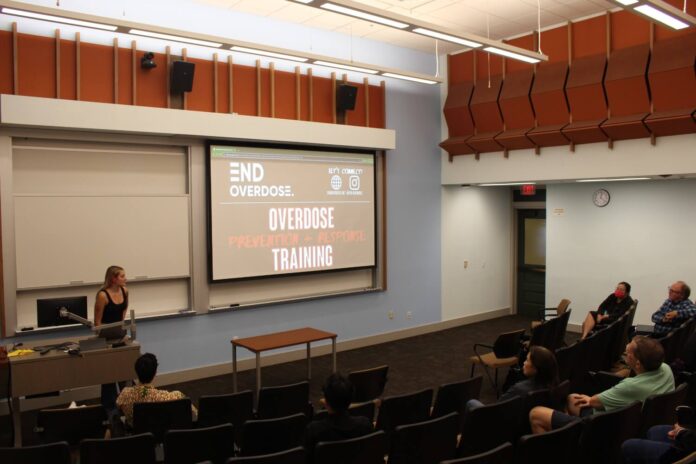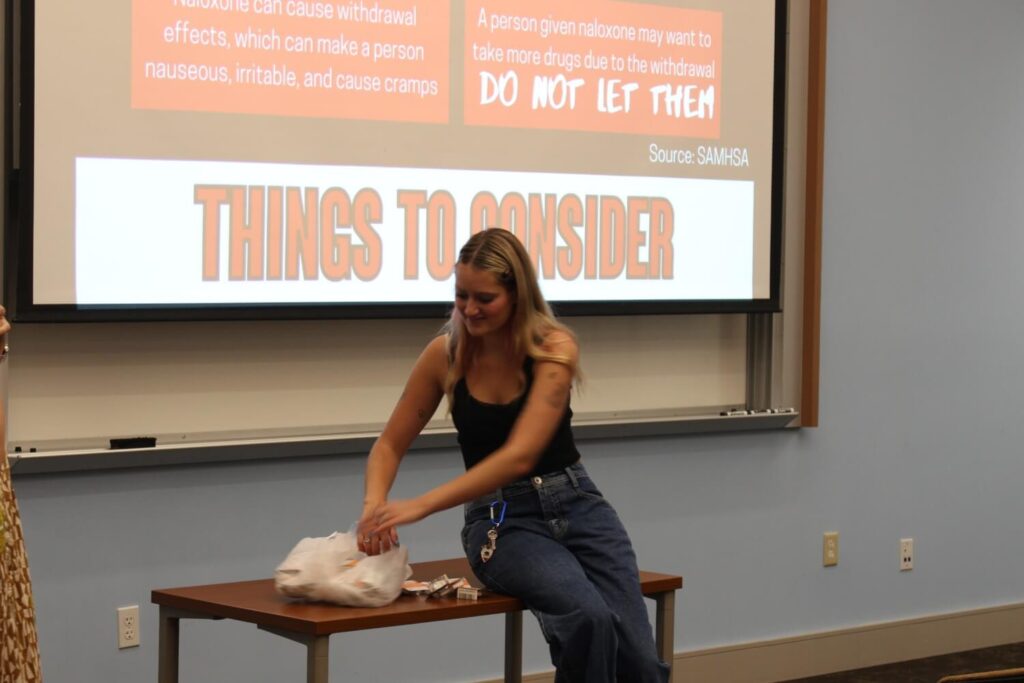
End Overdose, a non-profit for overdose prevention and response, is taking on drug-related overdose at Occidental with hopes of starting a campus-wide dialogue about safe drug use, according to Occidental’s student-run chapter president Grace Adler (junior). End Overdose has several college chapters, but Adler said its presence at Occidental is uniquely felt as a smaller school.
According to Adler, the organization provides overdose intervention trainings and maintains a close relationship with the school and has trained the staff of Emmons Wellness Center, Campus Safety and Residential Education & Housing Services. Almost 600 students were trained during orientation week, a number that is up from around 200 students last year. Adler said there is a certain importance in educating and training first years who might be exposed to drugs for the first time and the organization is hopeful to expand their reach even further.
At a young age, Adler lost her father to an overdose and since has had several friends overdose. Adler said this personal connection highlighted the urgency of overdose intervention and was a major motivating factor behind her decision to facilitate overdose training at Occidental. After a friend overdosed her first year at Occidental, Adler said she realized the school was underprepared and this spurred her to bring End Overdose to campus in September 2022.

“I realized that Oxy needed to have more of a response plan, and [students] needed to be better equipped. They needed to have Naloxone or Narcan on them, and that was something that really wasn’t present at school,” Adler said.
Naloxone, or its brand name Narcan, is an opioid antagonist medication that is administered nasally and can reverse an overdose within two to three minutes. End Overdose distributes Naloxone because having this medication on hand could save a life. The chapter provides a free dose of Naloxone at their training with the goal of preparing as many students as possible should they need to intervene in an overdose scenario, according to Adler.
In addition to receiving a free dose of Naloxone, students who participate in the training are educated on what exactly an overdose is, how to recognize the symptoms and how to respond to it.
“We emphasize calling 911 and how you are protected by Good Samaritan Law, and you’re protected by Oxy’s medical amnesty policy. So if someone is reacting to an overdose, and they’re afraid of calling [campus safety] or they’re afraid of asking their RA for help, that kind of takes away a lot of that fear,” Adler said.
End Overdose treasurer Anna Rashkin (junior) said that the organization’s main goal is educating the student body.
“I think the main goal is education. There are only two thousand students on the campus. So it’s not an unreasonable goal of getting everyone Narcan trained, everyone prepared to respond to an overdose,” Rashkin said. “At a school like Oxy, we’re in a position where we can really make sure the entire student body is educated.”
A major goal of the education End Overdose provides is working against preconceived notions about drug use and overdoses. Rashkin said people are often hesitant to even acknowledge using Narcan or testing drugs because it could be seen as promoting drug use. They said that End Overdose acknowledges that people will use drugs, and is focused on providing resources to prevent the worst-case scenarios.
August Leifeld (junior) said there are misconceptions about who needs to be prepared for overdose intervention. People who aren’t interested in doing drugs or being around them might think they don’t need to be prepared to respond to an overdose, according to Leifeld. However, the specific environment of a college campus is conducive to drug-related incidents in a way that could affect anyone at any time, Leifeld said, especially given the growing opioid crisis.
“Oftentimes at events, a response we’ll get is, ‘Oh, I don’t do drugs,’ or ‘My friends don’t do drugs, I don’t need Narcan or test strips or anything like that.’ It’s a totally normal response to have but on a college campus, you never know who you’re going to be in proximity to, especially in dorms. It’s super important for everyone to be prepared,” Leifeld said.
According to Adler, the organization utilizes a harm-reduction approach, a non-judgmental set of practical strategies that aims to reduce the harm of drug use. Adler said the goal of harm reduction is transforming the anger and pain that stems from overdoses experienced by those affected by it into compassion and love. Rather than an abstinence approach, End Overdose hopes to start conversations about drug use and overcome the stigma that surrounds it, according to Adler.
“There’s a lot of demonization towards drug users, “ Adler said. “And I think having these educational trainings and relinquishing a lot of stigma around drug use causes people to want to have a conversation rather than isolating and not talking about it.”
Contact Bea Irwin at birwin@oxy.edu
![]()






























